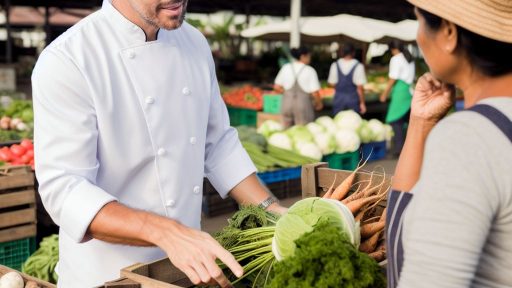Introduction to Artisanal Food Production
Defining Characteristics
Artisanal food production emphasizes quality over quantity.
This approach fosters craftsmanship and traditional methods.
Artisanal products often use local and seasonal ingredients.
Additionally, the focus is on small-scale production.
Producers typically prioritize sustainable practices.
Artisanal foods reflect unique regional characteristics.
This makes each product distinct and personal.
Generally, artisans value transparency in their processes.
Consumers appreciate the story behind each product.
Moreover, this approach nurtures a closer connection to food.
Quality over Quantity
Artisanal production often results in superior taste and texture.
For instance, hand-crafted cheeses differ significantly from mass-produced varieties.
This dedication to quality builds a loyal customer base.
Furthermore, artisans often innovate, creating unique flavors and combinations.
Sourcing Ingredients
Local sourcing is a hallmark of artisanal food production.
Transform Your Agribusiness
Unlock your farm's potential with expert advice tailored to your needs. Get actionable steps that drive real results.
Get StartedThis approach reduces transportation costs and carbon footprints.
Many artisans establish relationships with farmers and suppliers.
As a result, they can support local economies.
Sustainable Practices
Artisanal producers often embrace eco-friendly methods.
This includes minimizing waste and using renewable resources.
Such practices attract consumers concerned about the environment.
Additionally, sustainable operations often yield better long-term results.
Benefits of Home-Based Artisanal Food Businesses
Economic Advantages
Home-based artisanal food businesses boost local economies.
They create jobs and support community engagement.
Additionally, these businesses foster innovative food practices.
Moreover, they reduce overhead costs compared to traditional setups.
Operating from home enables flexibility in pricing strategies.
As a result, businesses can attract a diverse customer base.
Personal Fulfillment
Running a home-based food business brings personal satisfaction.
It allows individuals to pursue their culinary passions.
Creativity flourishes in such an environment.
Home-based chefs can tailor offerings to meet local tastes.
This approach promotes a sense of community connection.
Furthermore, small-scale production encourages personal relationships with customers.
Sustainability and Quality
Artisanal food production often focuses on sustainable practices.
Home-based businesses can prioritize local sourcing of ingredients.
This commitment enhances the overall quality of products.
Consumers appreciate fresh, high-quality options.
Importantly, these businesses can experiment with seasonal ingredients.
Showcase Your Farming Business
Publish your professional farming services profile on our blog for a one-time fee of $200 and reach a dedicated audience of farmers and agribusiness owners.
Publish Your ProfileConsequently, they contribute to reducing food waste.
Market Trends
There is a growing demand for unique, artisanal products.
This trend creates opportunities for home-based businesses.
Consumers increasingly seek authentic food experiences.
By meeting this demand, artisans can thrive in the marketplace.
Additionally, social media provides platforms for promotion.
This visibility helps small businesses reach a wider audience.
Essential Equipment for Starting an Artisanal Food Venture at Home
Basic Kitchen Essentials
Every artisanal food producer needs a well-equipped kitchen.
Start with high-quality kitchen knives.
Cutting boards are equally important for safe food prep.
Invest in mixing bowls of various sizes for versatility.
This helps you manage different ingredients easily.
Don’t forget essential measuring tools.
Measuring cups and spoons ensure consistency in your recipes.
Cooking Appliances
A reliable oven is crucial for baking and roasting.
Consider a stand mixer for heavy-duty mixing tasks.
Food processors can save time when chopping and blending.
Additionally, a sous vide machine can enhance cooking precision.
Each appliance adds value to your food production process.
Preserving Equipment
If you plan on canning, investing in a canning kit is wise.
This includes jars, lids, and a canning pot.
For fermentation, specialized jars and fermentation weights are useful.
These tools help you create unique flavors in your products.
Furthermore, a vacuum sealer can extend the shelf life of your goods.
Packaging Tools
High-quality packaging is key to presenting your food.
Consider a heat sealer for securing your packages.
Labels are important for branding and providing information.
Invest in eco-friendly packaging options to appeal to customers.
This demonstrates your commitment to sustainability.
Storage Solutions
Effective storage solutions keep your kitchen organized.
Utilize clear containers to easily identify ingredients.
Label your containers to maintain freshness.
A spice rack can also optimize space and access to seasonings.
By organizing, you can enhance your workflow in the kitchen.
Cleaning Supplies
Maintaining cleanliness is essential in food production.
Stock up on sanitizers and dish soaps for efficient cleaning.
Microfiber cloths help with daily surface cleaning.
A reliable mop and bucket ensure your floors stay clean.
Additionally, a kitchen timer can help manage your cleaning schedule.
Delve into the Subject: Permaculture Practices for Increasing Pollination and Plant Health
Showcase Your Farming Business
Publish your professional farming services profile on our blog for a one-time fee of $200 and reach a dedicated audience of farmers and agribusiness owners.
Publish Your ProfilePopular Types of Artisanal Foods
Bread
Bread is one of the most beloved artisanal foods.
Craft bakers utilize traditional techniques and quality ingredients.
They often focus on sourdough and whole grain varieties.
Many local bakeries are gaining popularity for their unique flavors.
Cheese
Artisanal cheese production involves meticulous craftsmanship.
From creamy bries to sharp cheddars, the variety is extensive.
Some cheese makers use traditional recipes handed down through generations.
Additionally, local milk sources add character to the cheese.
Jams
Homemade jams capture the essence of seasonal fruits.
Artisans often prioritize high-quality, organic ingredients.
They use minimal sugar to preserve the original fruit flavors.
Unique combinations, such as lavender and berry, are gaining attention.
Other Artisanal Foods
This category includes a plethora of specialty products.
Examples range from handcrafted chocolates to infused oils.
Artisan pickles and fermented products are also becoming popular.
These foods reflect personal touches and local influences.
Gain More Insights: Organic Cover Cropping Strategies for Soil Fertility
Understanding Local Regulations and Food Safety Standards
Importance of Compliance
Compliance with local regulations is crucial for food businesses.
It ensures customer safety and builds trust in your products.
Additionally, it helps avoid legal issues and penalties.
Researching Local Regulations
Start by researching the regulations specific to your area.
Check with local health departments for guidelines.
Join local food business networks for insights and support.
Licensing and Permits
Most food businesses require specific licenses and permits.
Follow the application processes as outlined by local authorities.
Ensure your business complies with zoning laws as well.
Food Safety Standards
Adhering to food safety standards protects customers and your business.
Familiarize yourself with the Hazard Analysis Critical Control Point (HACCP) principles.
Implement food safety practices in your production process.
Good Manufacturing Practices
Good Manufacturing Practices (GMP) are essential to maintain product quality.
Train your staff on hygiene and sanitation protocols.
This reduces the risk of contamination and ensures food safety.
Labeling Requirements
Proper labeling is critical for customer safety and compliance.
Include all required information on your product labels.
This typically includes ingredients, allergens, and nutritional information.
Regular Inspections and Updates
Local health departments regularly inspect food businesses.
Stay updated on changing regulations that affect your operations.
Schedule regular internal audits to ensure compliance is maintained.
Hiring Food Safety Experts
Consider hiring food safety experts to guide your business.
They can provide valuable advice on compliance and best practices.
Showcase Your Farming Business
Publish your professional farming services profile on our blog for a one-time fee of $200 and reach a dedicated audience of farmers and agribusiness owners.
Publish Your ProfileThis investment can save you time and potential costs in the future.
See Related Content: Why Food Traceability Is Essential for Organic Farming Standards

Marketing Strategies for Home-Based Artisanal Food Products
Identify Your Target Audience
Understanding your target audience is crucial for success.
Identify specific demographics interested in your products.
Analyze their preferences, habits, and buying behavior.
This insight helps tailor your marketing efforts effectively.
Create a Unique Brand Identity
A strong brand sets you apart from the competition.
Choose a memorable name that reflects your product’s essence.
Design an attractive logo that resonates with your audience.
This visual representation of your brand builds recognition.
Utilize Social Media Platforms
Social media offers an excellent venue for promotion.
Platforms like Instagram and Facebook can showcase your products.
Engage followers with high-quality images and videos.
Share behind-the-scenes content to create authenticity.
Leverage Local Markets and Events
Participating in local markets helps increase visibility.
Set up a booth and offer samples to attract customers.
Network with other vendors to expand your reach.
Consider collaborating on events to boost exposure.
Implement a Content Marketing Strategy
Content marketing builds trust and credibility.
Share recipes or tips related to your artisanal food products.
Consider starting a blog that showcases your ingredients.
This approach keeps your audience engaged over time.
Seek Customer Feedback and Reviews
Customer feedback is invaluable for improvement.
Encourage reviews on your website and social media platforms.
This feedback builds trust with potential customers.
Use positive reviews in your marketing efforts.
Build an Email List
Email marketing remains a powerful tool for reaching customers.
Offer incentives, like discounts, for signing up.
Send regular newsletters featuring updates and promotions.
This helps maintain ongoing communication with your audience.
Optimize for Search Engines
SEO can drive organic traffic to your site.
Use relevant keywords to boost your search engine ranking.
Write informative product descriptions and blog posts.
This increases your visibility to potential customers online.
Collaborate with Influencers
Influencer marketing can amplify your reach.
Identify local food bloggers or social media influencers.
Offer them your products for review or promotion.
This can introduce your brand to a wider audience.
Discover More: Best Practices for Local Food Sourcing on Farms
Sourcing Ingredients
Finding Quality Suppliers
Quality ingredients define artisanal food products.
Showcase Your Farming Business
Publish your professional farming services profile on our blog for a one-time fee of $200 and reach a dedicated audience of farmers and agribusiness owners.
Publish Your ProfileStart by researching potential suppliers in your area.
Look for vendors that prioritize quality and taste.
Consider joining local farmer’s markets for direct access.
Building relationships with suppliers can enhance your business.
Communicate clearly about your ingredient needs and expectations.
Assessing Sustainability
Sustainable sourcing supports the environment and your community.
Evaluate suppliers based on their farming practices and certifications.
Seek out organic or regenerative farms as preferred sources.
Ask suppliers about their sustainability initiatives during meetings.
Support local businesses to reduce your carbon footprint.
Diverse Ingredient Sourcing
Diversity in sourcing can enrich your product offerings.
Explore various types of suppliers, such as boutique importers.
Consider specialty farms that grow unique or heirloom varieties.
Expand your network to include diverse culinary cultures.
This approach can inspire creativity in your recipes.
Building Supplier Relationships
Strong relationships with suppliers foster reliability.
Communicate regularly to discuss any changes in pricing or availability.
Consider visiting suppliers to see their operations firsthand.
Personal connections can often lead to better deals.
Always express appreciation for their work and contributions.
Building an Online Presence
E-Commerce for Artisans
An online store helps reach customers beyond local markets.
Start by choosing a reliable e-commerce platform.
Platforms like Shopify or WooCommerce offer user-friendly interfaces.
Customize your store to reflect your brand identity.
High-quality images will attract more customers.
Include detailed product descriptions to inform buyers.
Consider implementing a secure payment gateway.
This adds trust and encourages transactions.
Offer various payment options for customer convenience.
Emphasize local delivery options or shipping policies.
Promote your products through effective social media marketing.
Strategies for Social Media
Social media platforms are essential for brand visibility.
Create profiles on Instagram, Facebook, and Pinterest.
Regularly post engaging content that resonates with your audience.
Share behind-the-scenes glimpses of your production process.
This helps build a personal connection with customers.
Utilize hashtags to increase post reach and visibility.
Engage with followers by responding to comments and messages.
Host giveaways to create excitement around your brand.
Collaborate with influencers who align with your values.
Showcase Your Farming Business
Publish your professional farming services profile on our blog for a one-time fee of $200 and reach a dedicated audience of farmers and agribusiness owners.
Publish Your ProfileThis can broaden your audience effectively.
Building Customer Loyalty
Establish loyalty programs to reward repeat customers.
Offer exclusive deals or early access to new products.
Send personalized follow-up emails post-purchase.
This keeps communication open and shows appreciation.
Encourage customer reviews to build trust and authenticity.
Respond professionally to both positive and negative feedback.
Emphasize community involvement in your marketing efforts.
Show that your business cares about local initiatives.
Additional Resources
What Does Farm-to-Table Mean Anymore? | Vanity Fair
Grants & Financial Options | Food Safety and Inspection Service




